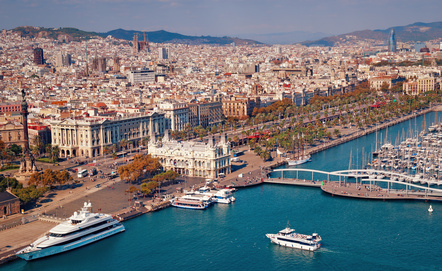 The visit to the Pablo Picasso Museum was a mind-ruminating experience. I can’t say I comprehended everything I saw, nor can I say I was able to appreciate everything I saw – what was up with that “blue period” and why did shading every drawing/painting in blue inherently give it special significance? Nevertheless, I enjoyed the tour and was reflecting on what I saw when I plopped myself down on a bench in a park across the street from the museum. My mid-day hunger pangs had gotten the better of me, so right after I exited the museum, I went straight to one of the many food vendors nearby, bought myself a sandwich and a Coke, and added my company to a handful of people casually lounging about the park, or at least I thought tha’s what everyone there was doing.
The visit to the Pablo Picasso Museum was a mind-ruminating experience. I can’t say I comprehended everything I saw, nor can I say I was able to appreciate everything I saw – what was up with that “blue period” and why did shading every drawing/painting in blue inherently give it special significance? Nevertheless, I enjoyed the tour and was reflecting on what I saw when I plopped myself down on a bench in a park across the street from the museum. My mid-day hunger pangs had gotten the better of me, so right after I exited the museum, I went straight to one of the many food vendors nearby, bought myself a sandwich and a Coke, and added my company to a handful of people casually lounging about the park, or at least I thought tha’s what everyone there was doing.
The sky was blue. The sun was shining. The birds were singing. The . . .
Okay, okay, I’ll stop it with the depictions of a perfect day, but can you blame me? I’d just visited the museum of a world-renowned artist and was ensconced on a park bench with a sandwich in one hand, a Coke in the other, and had nothing more to do than lazily lap up the scenery with my backpack sitting next to me on the bench.
With everything going right, what could possibly go wrong?
If only I had asked myself that question before setting myself up as a hapless victim – and an Asian victim at that (you’ll see later why I point that out) – I wouldn’t have had to learn a valuable lesson in travel the hard way.
As my mind was lazily drifting off to . . . somewhere, all of a sudden, I heard someone yell, “Chino! Hey Chino!” I jerked my head to my right and saw a guy in his early twenties, Middle-Eastern looking, waving his hands up and down, maintaining his yell of, “Chino! Hey, Chino!” Then just as abruptly as he started yelling at me, he just as abruptly stopped, turned around, and ran the other way.
In a few blinks of an eye, several thoughts tumbled through my mind. To the best of my memory, the thoughts came to me in this sequence:
1) “Chino” is Spanish for “Chinese.” (I’d picked up a few words of Spanish living in Southern California, and this was one of the words I acquired early on.) Why did this guy think I was Chinese? Didn’t he know I was Vietnamese?
2) Why the heck was he calling out to me and waving his arms up and down like that?
3) He’s running away from me. Why would he call out to me and run away from me . . . unless . . .
4) Oh (expletive)! He’s trying to distract me!
I jerked my head to the left and looked down at my backpack!
It was gone!
I jumped up! Looked left and right, thinking, No! Don’t tell me I’ve just been robbed!
As much as I wanted to deny it, I knew that was exactly what happened. The feeling was sickening. I couldn’t believe it. I’d just been robbed!
Then out of nowhere, I heard a woman’s voice, shouting, “You! You!” I turned in the direction of the voice. A few people had been having coffee on an outdoor terrace of a coffee shop at the entrance to the park. One of them, a woman in her fifties and on the verge of becoming heavy-set, the one who’d shouted out to me, had jumped up and was motioning to me and pointing in the direction of the busy street that ran in front of the museum. It took me only a second to read the urgent look on her face, one that must have been almost as frantic as the one on mine. It was a look that cried out, “The guy who snatched your backpack ran off into the street!”
I bolted in that direction, turned the corner, and came to a dead halt when I saw nothing but a sea of tourists walking up and down the street. Completely absent was any sign of a thief trying to make a hurried getaway.
The sinking feeling that crashed over me was akin to that of a certain gigantic ship hitting an even more gigantic iceberg. Without a doubt, I knew my backpack was gone.
Dejected, damning myself for not being more vigilant of my possessions, and damning the culprits for making me pay the price of being so negligent, I turned around and went back to the park. There, I was reminded of the good that can exist in our society.
The woman who’d alerted me as to which way the perpetrator went was waiting for me at the coffee shop. When she saw me coming back empty handed, she and the man whom I assumed to be her husband rose from their seats and greeted me with sympathetic eyes. She motioned for me to have a seat at her table. In the following precious minutes, she would guide me through a series of actions what would assist me in recuperating the financial loss of my belongings and, possibly, the retention of my physical well-being as well.
Spanish, regrettably, is a language in which I am far from fluent. The language barrier for the remainder of the incident was challenging, but far from insurmountable. Through a combination of the non-verbal facets of facial expressions, hand gestures, and an overall absorption of our altruistic encounter, I was able to glean what was being said to me. In light of that innate comprehension, I believe I can accurately recount what was said during our exchange, and will now do so in English.
“He got away?” the woman asked me with empathy.
I nodded. “Yes.”
“That’s terrible! Terrible!”
Her husband agreed. “Yes! Terrible!”
Now what? I asked myself. In that backpack were my camcorder, eyeglasses, and a favorite book I was reading – all gone in a single snatch. Luckily, my stash of money and passport were safely tucked away in my room back at the pension (pen-see-on). None of the things stolen had left me in dire straits. Nevertheless . . . now what?
The woman whom I’ll go ahead and refer to as “Maria,” (and her husband as “Albert”), must have read the look on my face, for they said the word Policia and waved to a waitress who’d come out onto the terrace. Policia, or Spanish for “police” was, as chance would have it, a word I’d already had an opportunity to become familiar with in Barcelona.**
I looked on as Maria told the waitress what happened. I watched as the expression on the waitress’ face metamorphosed from What can I do for you?” to “Oh, my God! They stole his backpack!” At the end of Maria’s recounting, the waitress, a rather attractive gal, nodded with a look of determination. Right before she hurried back into the cafe, she flashed me a look of empathy. As much as I would have liked the look to have said, “You poor thing. After this is over, I’ll take you out and show you the real sights of Barcelona!”, I know in reality that the look actually said, “You poor thing. I’ll call the cops right now and hopefully they can catch those crooks and return your things to you.”
Minutes inched by while we waited for the authorities to arrive. Normally, I would have made some small talk with Maria and Albert, but all I could do at the time was relive those shocking seconds in which I lost my backpack. Over and over, I was simultaneously asking myself how I could have let such a thing happen, and how could such a thing have happened to me? I don’t know how long I stayed in that self-loathing, self-pitying state of mind, but something happened unexpectedly that snapped me out of it.
I heard Maria gasp, “He’s back!”
Perplexed, I looked up from the spot I’d been staring at on the ground. I saw Maria looking across the park with an expression comprised of shock, anger, and outright disgust. I followed her gaze, and when I saw what she saw, I too gained an expression comprised of shock, anger, and outright disgust.
Believe it or not, standing on the other side of the park was none other than the guy who waved at me and yelled “Chino!” in order to distract me and allow his accomplice to sneak up behind me and steal my backpack. He was just standing there, looking as nonchalant as can be, acting as though he’d done nothing wrong.
No. Wait. Let me rephrase that.
He was just standing there, looking as nonchalant as can be, acting as though he knew he’d done something wrong but could do so with impunity because there wasn’t a damn thing I could do about it.
I couldn’t believe the son of a bitch! Brazenly broadcasting that he’d taken my belongings and daring me to go over there and do something about it. If it was a challenge he was looking for, then it was a challenge he was going to get. I sprang up out of my chair and started to take a step in his direction – only to have Maria put up a hand and tell me to stop where I was.
Befuddled, I looked at her. The question mark was apparent on my face: why are you stopping me?
Maria shook her head vigorously. With a hand that was firmly gripped around the handle of a pretend knife, she made several stabbing motions at me. Despite the language barrier, her message was clear: you go over there, and those guys will stab you to death!
A quick survey of the dilapidated apartment buildings behind my perpetrator told me I would be wise to heed Maria’s warning. The setting looked bleak, forbidding. They resonated a squalor that only the indigent could attest to. It was a squalor I knew well, for at one point in my family’s history, it was in such a place that we had to make our home.
Poverty can have different effects on people. It can make them work twice as hard to get themselves out of their predicament. Or, it can make them steal, plunder, and commit who knows what other kinds of crimes to get themselves out of their predicament. It didn’t take a degreed sociologist to register which path my perpetrators had taken.
Call me a coward, but I quickly took Maria up on her advice. I sat my butt right back down in that chair. The scenario that hurtled through my mind was too threatening. As I was walking to the Picasso Museum earlier that day, I could tell that the area wasn’t in the best of neighborhoods. One glimpse at the run-down apartment buildings like the ones on the other side of the park told me that I should watch my back while I was in the area. (Yes, I apparently failed to listen to my own caveat, but you can whip me with a wet noodle later.)
Had I chosen to disregard Maria’s warning, I could see me running over there to catch the guy who was probably the mastermind behind the theft of my backpack. I could see him running away, pretending to be trying to elude me while actually leading me into a labyrinth of maze-like alleyways. And once I was good and lost, perhaps facing the dead-end of a trash-strewn alley, he would stop, turn to me, and reveal a sinister smile. Then, his accomplices would begin to appear – and one of them, perhaps all of them, would unveil the knives they would use to make me pay for the foolish mistake I’d made of actually thinking I could chase them down and bringing them to justice in their own backyard. Slowly but assuredly, I could see them closing in on me like a noose around the hapless neck of a condemned prisoner. Trapped and desperate, I could hear one of them scornfully laughing at me, telling me, If you think us taking your backpack was bad, just wait until you see what we do with your life!”
I may not be the smartest guy around, but I know when I would be putting myself at a severe disadvantage. The bad guys had already shown me how easily they could run away with my property. I wasn’t about to let them show me how easily they could run away with my life too. Furthermore, and while this won’t bolster the image of my machismo in any way, I’ll be the first to admit I’m much more of a writer than I am a fighter. A fighter’s definition of a good day’s work is to knock somebody out with a mean, right hook. To a writer like me, however, the definition of a good day’s work is to come up with a sentence that has really good subject-verb agreement.
With some effort, I tore my eyes away from the perpetrator across the park who was taunting me with his very presence. Minutes later, two policemen arrived. As soon as they showed up, I looked to see if the guy who necessitated their arrival was still loitering around so I could point him out to the police. Of course, he wasn’t.
At that point, there wasn’t anything more I could do except give the policemen my account of what happened and hope for the best. As it turned out, the best did materialize.
When I booked my hostel room on the internet, I also bought some travelers insurance. I’d never purchased travelers insurance before, but this trip was going to be the first time I would be staying in a hostel or a pension, and since this territory of travel was new to me, I thought I’d play it safe and buy some insurance. Little did I know that my decision would pay dividends.
As soon as I returned to my home in Southern California, I filed a claim with my insurance. Afterwards, I told my friend in the insurance business what had happened and informed him of the claim I’d filed. To my surprise, Scott told me there’s a good chance that the insurance company will refuse to pay. When I asked him why, he told me the business is rife with fraud and that anybody could purchase some insurance, have something “happen” on their trip, and then file a claim. I could see his point and prepared myself for a battle with the insurance company. To my (and Scott’s) surprise, such a battle proved unnecessary. The insurance company sent me a check to cover my losses without a peep of protest. Upon reflection, I think I know why, and all of it had to do with the bystanders in Barcelona.
When the policemen arrived to get a report, I discovered that their English was about the same as my Spanish – nonexistent. It was Maria and Albert who then stepped in. It was they who talked to the policemen. It was they who gave an eyewitness account of what happened. Without their intervention, the policemen might have ended up with a shoddy report, or even no report at all given how they and I were incapable of communicating with each other. With Maria and Albert on hand to give them a detailed account of the theft in all of its inglorious details, however, the policemen were able to get a comprehensive account of the crime and fully document the circumstances of the theft. In turn, it was that detailed report that proved the authenticity of the incident to my insurance company, and it was with that proof on file that the insurance company was compelled to compensate me for my loss.
Lastly, there is that bit about being another Asian victim in Barcelona. Before I started my trip, I read in one of the guide books that Barcelona had one of the highest crime rates against tourists in Europe, and for some particular reason, the highest demographics of victims were Asians. When I read this, I wondered if I could fall prey to the elements of crime and quickly scoffed at the idea. I was too well-traveled, too well-learned in the ways of the world, I told myself. And look what happened. I ended up as yet another victim, another statistic to bolster the fact that most of the tourists who fell prey to the criminal element in Barcelona were indeed Asians.
Ever since that unfortunate ordeal, I’ve learned a thing or two about thwarting the claws of the criminally-minded, and it’s a lesson I hope you’ll allow me to pass on to you. When out and about, always keep your belongings in front of you where you can keep an eye on them. Better yet, keep your belongings in front of you and keep an arm around a bag strap or something like that so you can see and feel the theft the instant it happens.
Assume that the bad guys are always lurking about, scoping for an easy meal, and if you’re in a touristy place, chances are that they probably are. If they see that you’re vigilant of your belongings, they will be more deterred from making you their next victim. Yet, in the event that you’ve done all you can and you still fall victim to a crime, then I hope you will at least gain the benefit of an altruistic intervention like I did with my Barcelona bystanders.





Leave a Reply